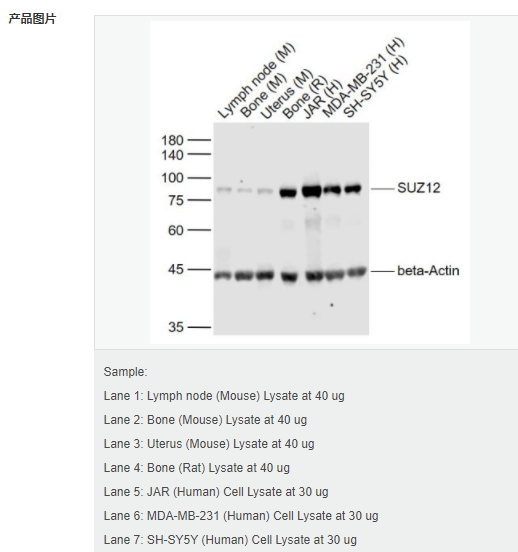

货号
产品规格
售价
备注
BN42142R-50ul
50ul
¥2020.00
交叉反应:Human,Mouse,Rat 推荐应用:WB,ICC,IF,ELISA
BN42142R-100ul
100ul
¥3240.00
交叉反应:Human,Mouse,Rat 推荐应用:WB,ICC,IF,ELISA
产品描述
| 英文名称 | SUZ12 |
| 中文名称 | 胚胎干细胞抑制蛋白Suz12抗体 |
| 别 名 | ChET 9 protein; Chromatin precipitated E2F target 9 protein; JJAZ1; Joined to JAZF1 protein; KIAA0160; Polycomb protein SUZ12; Suppressor of zeste 12 protein homolog; SUZ12; CHET9; Polycomb protein SUZ12; hET 9 protein; SUZ12_HUMAN; CHET9. |
| 研究领域 | 肿瘤 免疫学 信号转导 细胞凋亡 转录调节因子 激酶和磷酸酶 |
| 抗体来源 | Rabbit |
| 克隆类型 | Polyclonal |
| 克 隆 号 | 3C1 |
| 交叉反应 | Human, Mouse, Rat, |
| 产品应用 | WB=1:1000-2000 ELISA=1:5000-10000 IP=1:20-100 ICC=1:50-200 IF=1:50-200 not yet tested in other applications. optimal dilutions/concentrations should be determined by the end user. |
| 分 子 量 | 83kDa |
| 细胞定位 | 细胞核 |
| 性 状 | Liquid |
| 浓 度 | 1mg/ml |
| 免 疫 原 | Recombinant human SUZ12: |
| 亚 型 | IgG |
| 纯化方法 | affinity purified by Protein A |
| 储 存 液 | 0.01M TBS(pH7.4) with 1% BSA, 0.03% Proclin300 and 50% Glycerol. |
| 保存条件 | Store at -20 °C for one year. Avoid repeated freeze/thaw cycles. The lyophilized antibody is stable at room temperature for at least one month and for greater than a year when kept at -20°C. When reconstituted in sterile pH 7.4 0.01M PBS or diluent of antibody the antibody is stable for at least two weeks at 2-4 °C. |
| PubMed | PubMed |
| 产品介绍 | UZ12 is a polycomb group (PcG) protein. PcG proteins act by forming multiprotein complexes, which are required to maintain the transcriptionally repressive state of homeotic genes throughout development. PcG proteins are not required to initiate repression, but to maintain it during later stages of development. They probably act via the methylation of histones, rendering chromatin heritably changed in its expressibility. SUZ12 is a component of the PRC2 complex, which methylates Lys-9 and Lys-27 residues of histone H3. SUZ12 is a component of the PRC2 complex, composed of EED, EZH2, SUZ12/JJAZ1, RBBP4 and RBBP7. This complex is distinct from the PRC1 complex, which contains many other PcG proteins like BMI1, CBX4, CBX8, PHC2, PHC3, SCMH1, RING1 and RNF2. SUZ12 mRNA is upregulated in a number of tumors including breast and colon. Function: Polycomb group (PcG) protein. Component of the PRC2/EED-EZH2 complex, which methylates 'Lys-9' (H3K9me) and 'Lys-27' (H3K27me) of histone H3, leading to transcriptional repression of the affected target gene. The PRC2/EED-EZH2 complex may also serve as a recruiting platform for DNA methyltransferases, thereby linking two epigenetic repression systems. Genes repressed by the PRC2/EED-EZH2 complex include HOXC8, HOXA9, MYT1 and CDKN2A. Subunit: Component of the PRC2/EED-EZH2 complex, which includes EED, EZH2, SUZ12, RBBP4 and RBBP7 and possibly AEBP2. The minimum components required for methyltransferase activity of the PRC2/EED-EZH2 complex are EED, EZH2 and SUZ12. Component of the PRC2/EED-EZH1 complex, which includes EED, EZH1, SUZ12, RBBP4 and AEBP2. The PRC2 complex may also interact with DNMT1, DNMT3A, DNMT3B and PHF1 via the EZH2 subunit and with SIRT1 via the SUZ12 subunit. Interacts with WDR77. Interacts with histone H1. Subcellular Location: Nucleus. Tissue Specificity: Overexpressed in breast and colon cancer. DISEASE: Note=A chromosomal aberration involving SUZ12 may be a cause of endometrial stromal tumors. Translocation t(7;17)(p15;q21) with JAZF1. The translocation generates the JAZF1-SUZ12 oncogene consisting of the N-terminus part of JAZF1 and the C-terminus part of SUZ12. It is frequently found in all cases of endometrial stromal tumors, except in endometrial stromal sarcomas, where it is rarer. Similarity: Belongs to the VEFS (VRN2-EMF2-FIS2-SU(Z)12) family. Contains 1 C2H2-type zinc finger. SWISS: Q15022 Gene ID: 23512 Database links: Entrez Gene: 23512 Human Entrez Gene: 52615 Mouse Omim: 606245 Human SwissProt: Q15022 Human SwissProt: Q80U70 Mouse Unigene: 462732 Human Unigene: 283410 Mouse Unigene: 473315 Mouse Important Note: This product as supplied is intended for research use only, not for use in human, therapeutic or diagnostic applications. |
